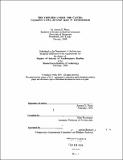The trouser under the cloth : Ceylon/Sri Lanka, personal space in the decolonization
Author(s)
Pieris, Anoma D. (Anoma Darshani)
DownloadFull printable version (43.77Mb)
Alternative title
Ceylon/Sri Lanka, personal space in the decolonization
Other Contributors
Massachusetts Institute of Technology. Dept. of Architecture.
Advisor
Sibel Bozdogan.
Terms of use
Metadata
Show full item recordAbstract
This thesis examines the processes of decolonization in Ceylon/Sri Lanka, through the expressions of personal space surrounding the event of political independence. Personal space is understood as dress, manners, and lifestyle which extend to the choices made of residential architecture in each period. The period before independence, 'The trouser under the cloth', i.s influenced by colonial projections of self, imposed by the colonial administration. The period after independence, 'Personal space in decolonization', is seen as resistant to these previous identities with attempts made at cultural revival by emergent nationalist movements. Each of these periods feature hegemonic cultural processes and an intellectual bourgeoisie that figure prominently in their projection. The positions adopted by this intellectual bourgeoisie to promote or challenge these processes often reveal attempts at maintaining the imaginative potential of the nation. The shift from filiative to an affiliative conception of society and their own identity provoke a more secular interpretation for 'the people'. The objective of this thesis is to use architectural examples to illustrate the degree to which political ideology infiltrated personal space during the decolonizing process and to examine the structures that were invented/imagined, for alternative (non political) means of cultural self empowerment.
Description
Thesis (M.S.)--Massachusetts Institute of Technology, Dept. of Architecture, 1994. Includes bibliographical references (p. 244-247).
Date issued
1994Department
Massachusetts Institute of Technology. Department of ArchitecturePublisher
Massachusetts Institute of Technology
Keywords
Architecture.